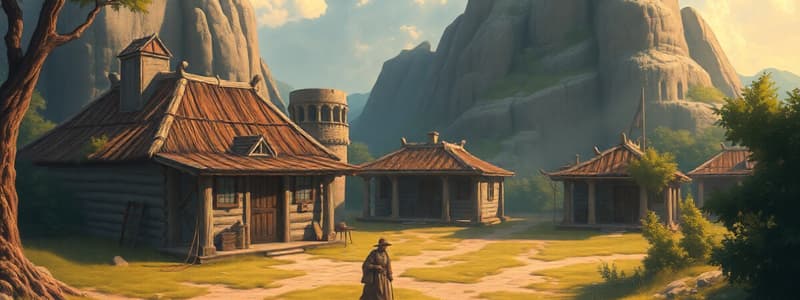Podcast
Questions and Answers
What does the term 'interpret' mean?
What does the term 'interpret' mean?
- To create a different version of something
- To explain or determine the meaning of something (correct)
- To hide the truth of a situation
- To determine the popularity of something
Which of the following best describes 'distinct'?
Which of the following best describes 'distinct'?
- Complicated and confusing
- Different in a noticeable way (correct)
- Bland and unremarkable
- Identical in every way
What is a 'pulley'?
What is a 'pulley'?
- A type of plant used for decoration
- A decorative piece of clothing
- An ancient tool used for farming
- A machine made of a wheel or set of wheels used with a rope or chain (correct)
What does 'dwindle' mean?
What does 'dwindle' mean?
Which of the following is true about 'epidemic'?
Which of the following is true about 'epidemic'?
What does the term 'domesticate' refer to in the context of early civilizations?
What does the term 'domesticate' refer to in the context of early civilizations?
Which term describes a narrow piece of land that connects two larger land masses?
Which term describes a narrow piece of land that connects two larger land masses?
What is a cenote?
What is a cenote?
What does 'commerce' refer to?
What does 'commerce' refer to?
In what context is the term 'sacred' used?
In what context is the term 'sacred' used?
What does 'arid' describe?
What does 'arid' describe?
Which term refers to a city that governs itself along with its surrounding area?
Which term refers to a city that governs itself along with its surrounding area?
What does it mean to 'symbolize' something?
What does it mean to 'symbolize' something?
Study Notes
Early American Civilizations Vocabulary
- Domesticate: To raise and train animals to live around humans, like a domesticated dog.
- Irrigate: To supply water using pipes or channels, like irrigating crops.
- Flourish: To be successful, like a flourishing business.
- Isthmus: A narrow piece of land that connects two larger pieces of land, like the Isthmus of Panama.
- Diverse: Made up of different people or things, such as a diverse group of students.
- Lush: Healthy and full, like a lush garden.
- Cenote: A natural well formed from a sinkhole, often filled with water.
- Descendant: A relative of someone who lived in the past, like a descendant of a king.
- Empire: A large territory or group of people under the total control of one ruler or government, such as the Roman Empire.
- Sieve: A tool with small holes for separating big and small pieces, used for cooking or sifting sand.
- Textile: Woven or knit fabric, used to make clothing, blankets, and other items.
Golden Age of the Maya Vocabulary
- Incessant: Continuing without stopping, like incessant rain.
- Penetrate: To go through or into something, like a needle penetrating fabric.
- Temple: A building devoted to religious worship, often a grand structure.
- Culture: The beliefs, traditions, and way of life shared by a group of people, like the Mayan culture.
- City-state: A city, and the area surrounding it, that governs itself, like ancient Athens.
- Trade: To give something in exchange for something else, or a job requiring special training or skills.
- Arid: Dry and having little rain, like a desert climate.
- Indigenous: Produced, living, or existing naturally in a particular area, such as indigenous plants.
- Commerce: The buying and selling of goods and services, like international commerce.
- Game: Animals that are hunted, or an activity done for pleasure or sport.
- Symbolize: To stand for an idea or characteristic, like a dove symbolizing peace.
Myths of the Maya Vocabulary
- Generation: A group of people born and living at the same time, like the generation of baby boomers.
- Sacred: Holy or deserving respect, like a sacred temple.
- Creation: The act of making something new, like the creation of the universe.
- Vast: Large or great in size, amount, or extent, like a vast desert.
- Nurture: To care for something or someone so that it/he flourishes, like nurturing a plant.
- Rigid: Stiff and inflexible, like a rigid rule.
- Warp: To bend or twist out of shape, like warping wood in the sun.
Hidden Secrets in the Rainforest Vocabulary
- Interpret: To explain or determine the meaning of something, like interpreting a dream.
- Distinct: Different in a noticeable way, like a distinct smell.
- Pulley: A simple machine made of a wheel or set of wheels used with a rope or chain to raise and lower objects, like a pulley system for lifting heavy weights.
- Mortar: A wet substance that hardens as it dries to hold bricks or stones together, used in construction.
- Stucco: A type of plaster used as decoration or to cover walls, often found on buildings in Mediterranean countries.
- Disperse: To spread apart in different directions, like dispersing seeds.
- Epidemic: A sudden, widespread illness, like a flu epidemic.
- Artisan: A person who is skilled at making things by hand; a craftsman, like a pottery artisan.
- Tunic: A knee-length piece of clothing, like a simple dress, often worn in ancient times.
- Dwindle: To become smaller or lessen over time, like dwindling resources.
Studying That Suits You
Use AI to generate personalized quizzes and flashcards to suit your learning preferences.
Related Documents
Description
Test your knowledge of vocabulary related to early American civilizations. This quiz covers key terms that are essential for understanding the cultural and historical context of these societies. Perfect for students looking to enhance their understanding of this fascinating topic.




